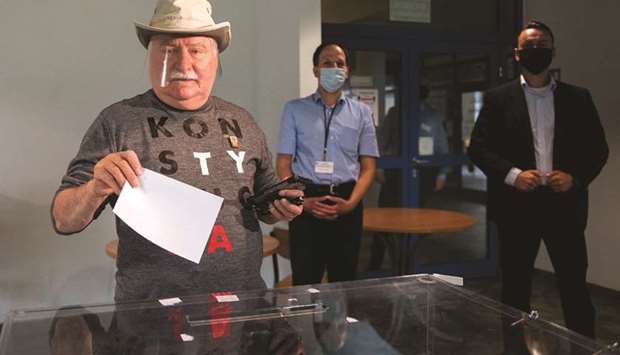Poles voted yesterday in a razor edge presidential run-off election between a populist incumbent allied with US President Donald Trump and a europhile liberal challenger, with experts saying the result will define the future of the country’s young democracy.
The stakes are high for Poland’s right-wing Law and Justice (PiS) party government, which has relied on incumbent President Andrzej Duda to endorse judicial reforms that have set Warsaw on a collision course with the EU over democratic standards just three decades after communism’s demise.
Duda was struggling to beat Warsaw mayor Rafal Trzaskowski of the opposition Civic Platform (PO) as final opinion polls showed the two running neck and neck.
Wojciech, a 59-year-old builder who declined to give his surname, said he chose Duda because his close ties to Trump meant Poland “can count on the US for defence”.
Warsaw pensioners who identified themselves only as Helena and Maria, both in their eighties, said they picked the pro-European Trzaskowski hoping he could “get things back on the right track with the EU”.
“We remember too well how it was before (under communism), so for our grandchildren we want Poland to be stable in Europe,” Helena told AFP.
Turnout had hit a record high 52.10% by 1500 GMT, the state elections commission said, suggesting the coronavirus pandemic had not dampened participation.
Long, snaking queues formed at polling stations as social distancing measures were used to stem infections.
Voters also had to wear masks, use hand sanitiser and their own pens, plus give priority to pensioners, pregnant women and voters with children.
The election had been due in May but was delayed because of the pandemic.
Duda’s support has slipped considerably since then, partly because of the virus fallout, which is pushing Poland into its first recession since communism fell.
Official results are expected today.
Experts warned that yesterday’s result could be too close to call, possibly triggering legal challenges and protests.
Duda won round one on June 28 with 43.5%, ahead of Trzaskowski with 30.4%.
Now the Warsaw mayor is hoping to sway voters who backed other candidates in the first round.
Eurasia Group, a political risk consultancy, said he will have to mobilise very disparate parts of the electorate against Duda, predicting the incumbent would therefore likely win, though by a narrow margin.
With analysts suggesting that strong voter mobilisation in rural Poland would give him the winning edge, Duda said he would “like to see the highest possible turnout” after voting in the southern city of Krakow.
Duda promises to defend highly popular social welfare payments introduced by the PiS government and has led a polarising campaign, ruling out certain Jewish wartime compensation claims.
Trzaskowski promises a very different Poland.
He has said he will roll back controversial PiS reforms of the judiciary that have triggered tension with the European Union.
A Trzaskowski victory could begin to loosen the PiS’s near-total grip on Polish politics.
A Duda win now on the other hand would cement the party’s power.
“This election will determine Poland’s fate for the foreseeable future,” said Adam Strzembosz, a former Supreme Court chief justice and respected legal authority.
“Will it be dominated and completely subservient to a certain political party, with all the consequences of power that is dictatorial in nature? Or will we manage to stop this?”

Former president Lech Walesa casts his ballot in Gdansk, Poland, during the second round of Poland’s presidential election yesterday.
